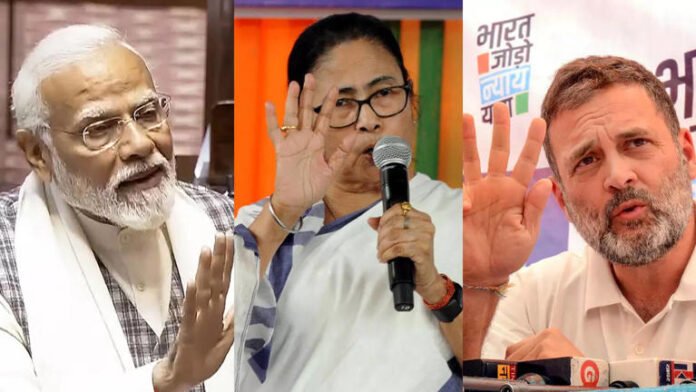In a recent political maneuver, Prime Minister Narendra Modi seized upon remarks made by West Bengal Chief Minister Mamata Banerjee to take a dig at the Indian National Congress. Modi’s strategic move underscores the intricate dynamics of political discourse and the art of leveraging opponents’ statements to score rhetorical points. The incident highlights the evolving landscape of Indian politics, where alliances shift and adversaries find common ground in pursuit of their respective agendas.
Mamata Banerjee’s remarks, in which she reportedly prayed for the Indian National Congress to secure at least 40 seats in the upcoming elections, provided Prime Minister Modi with an opportunity to cast aspersions on the Congress party’s political standing and electoral prospects. Modi’s response, delivered with characteristic wit and sarcasm, served to underscore his perception of the Congress as a beleaguered political entity struggling to maintain relevance in the contemporary political landscape.
By invoking Mamata Banerjee’s remarks, Prime Minister Modi sought to exploit divisions within the opposition ranks and portray the Congress party as a weakened and fragmented force incapable of mounting a credible challenge to the ruling Bharatiya Janata Party (BJP). Modi’s strategic use of Banerjee’s words not only served to undermine the Congress party’s electoral prospects but also reinforced the narrative of the BJP as the dominant force in Indian politics, capable of outmaneuvering its opponents at every turn.
Furthermore, Modi’s dig at the Congress highlights the broader trend of political polarization and the increasingly combative nature of Indian politics. In an era marked by sharp ideological divisions and intense partisan rivalries, politicians often seize upon any opportunity to score political points and discredit their opponents. Modi’s use of Banerjee’s remarks to target the Congress is emblematic of this trend, illustrating the lengths to which politicians will go to gain an advantage in the political arena.
Moreover, Modi’s strategic maneuvering reflects his keen understanding of the nuances of political communication and the importance of framing the narrative to suit his political objectives. By capitalizing on Banerjee’s remarks, Modi effectively framed the Congress party as a marginalized political force, overshadowed by the BJP’s dominance and relegated to the sidelines of Indian politics. In doing so, he sought to bolster the BJP’s image as the preeminent political force in the country, capable of steering India’s destiny with strength and conviction.
However, Modi’s use of Banerjee’s remarks also underscores the complexities of political alliances and the fluid nature of political discourse. While Banerjee’s remarks may have provided Modi with a convenient rhetorical tool to target the Congress, they also highlight the shifting dynamics of Indian politics, where erstwhile adversaries may find themselves aligned on certain issues or objectives. The incident serves as a reminder of the fluidity and unpredictability of political alliances in the Indian political landscape, where alliances are often forged and broken in pursuit of political expediency.
In addition, Prime Minister Narendra Modi’s use of Mamata Banerjee’s remarks to take a dig at the Congress party reflects the intricacies of political communication and the art of leveraging opponents’ statements to advance one’s own political agenda. Modi’s strategic maneuvering underscores his perception of the Congress party as a weakened political force struggling to maintain relevance in the face of the BJP’s dominance. However, the incident also highlights the fluid nature of political alliances and the complexities of political discourse in the Indian political landscape, where alliances may shift and adversaries may find common ground in pursuit of their respective agendas.

